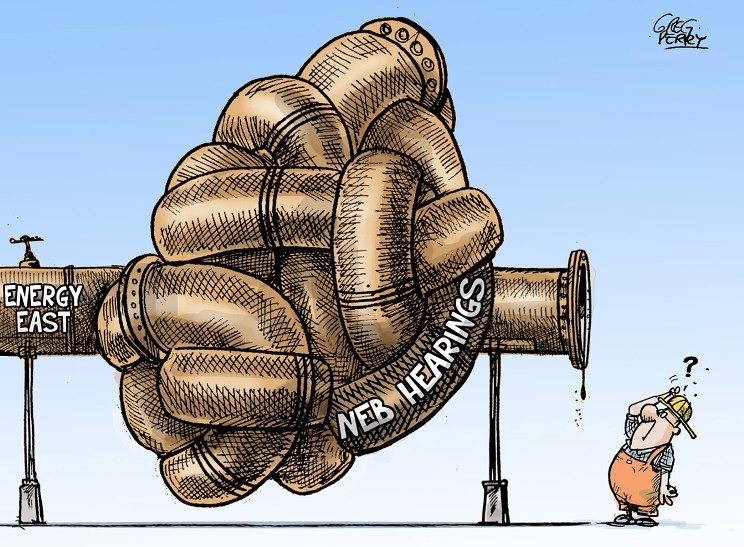Governance theory tells us that the National Energy Board — like scores of other quasi-independent public agencies — exists to make expert, impartial decisions in the public’s best interests. Cynics would add that its other key role is to protect the government of the day from being embroiled in unpopular decisions.
The NEB seems to be botching both tasks. Its bizarre behaviour has shredded its credibility. It has been caught holding secret ex parte tête-a-têtes with energy lobbyists, covering up its own mistakes with liberal use of the email “delete” function and scarpering from the public at meetings in communities as small as Bella Bella, B.C., and as large as Montreal.
Its disarray now threatens key parts of the government’s core agenda: achieving meaningful carbon emission reductions while not repeating the generational mistake an earlier Trudeau made over energy in Alberta.
Even if it hadn’t given up on serving either a publicly or politically useful purpose, it would still be time to put the National Energy Board down.
The NEB is obsolete, an anachronism, a captive service agency for one particularly toxic, last-century industry, rather than a police force for the public interest. Increasingly, it’s also a laughingstock.
The National Energy Board as currently constituted is not just beyond saving. It poses a real and present threat to Canada’s energy development, economic prosperity, social cohesion and institutional credibility, to say nothing of future generations’ hopes for a tolerable climate.
Enough already. It’s time to call time on an agency created in the age of Sputnik. The Board is hardwired by legislation written in 1959 to see energy solely in terms of what was available in the middle of the last century, and to be blind to the new energy sources and systems of the current century.
As an urgent priority at the next sitting of Parliament, the government should use its majority to stop the collapse of credible oversight of Canada’s strategic energy sector. It should pass emergency legislation to:
- Abolish the National Energy Board;
- Name a temporary panel drawn from the federal judiciary to oversee its essential functions, and;
- Launch a public, from-the-ground up process to design a replacement agency that is credible, competent and ready for a more complex future.
The NEB’s dated obsession with hydrocarbons is burned into its institutional DNA. It was torqued tighter by the Harper government, which freed it to dismiss natural security concerns, avoid the dissenting public and say “yes” even faster to fossil fuel projects.
The predictable result: an agency in shambles, caught up in ethical scandals and increasingly divorced from the reality of global energy policy, reeling from errors of its own making and lacking a constituency outside the fossil industry.
Even there, the NEB is losing its last supporters as it fails to deliver the “social license to operate” that energy companies thought they were applying for — even as it continues to grant their applications.
What would a regulator for the energy spectrum of the 21st century look like?
For starters, it would need to be a real energy agency — not a service for an industry that must all but disappear within 30 years.
Its mandate must incorporate all forms of energy: solar, wind, geothermal, bio- and marine energy. Even more important, it must embrace and track increasing energy conservation and efficiency — the “negawatts” that come from not consuming energy.
Its scenario planning must consider a far wider range of future supply, demand and distribution possibilities, beyond “business-as-usual” projections that show fossil demand growing through 2040.
A new regulator must be mandated to consider every project it reviews within the limits of a periodically updated carbon budget — looking both upstream and down. If an energy source threatens international efforts to re-stabilize the climate, it must not be developed.
A national energy board worthy of the name would recognize the public interest in participating in the next global jobs and investment boom, and embrace its own role in enabling it. That boom is being ignited as advanced economies shift from toxic and hazardous hydrocarbons to the next generation of zero-carbon and zero-fuel-cost energy supplies, evened out by storage technologies that are plummeting in price.
And the new agency should set a first principle of aligning every decision with the latest jurisprudence on First Nations rights and title.
Energy is essential to our economy. Our choices about where to get it and how to use it will not only determine our future wealth but decide the outcome of the biggest challenge we face as a society: restoring stability to our climate.
Canadians can’t afford to leave those choices to the incompetent, the blinkered and the beholden. Neither can our government. ![]()
Read more: Energy
















Tyee Commenting Guidelines
Comments that violate guidelines risk being deleted, and violations may result in a temporary or permanent user ban. Maintain the spirit of good conversation to stay in the discussion.
*Please note The Tyee is not a forum for spreading misinformation about COVID-19, denying its existence or minimizing its risk to public health.
Do:
Do not: